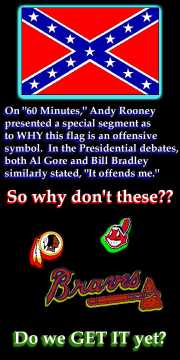|
|
Canku Ota |
|
|
(Many Paths) |
||
|
An Online Newsletter Celebrating Native America |
||
|
March 23, 2002 - Issue 57 |
||
|
|
||
|
Handling Racism With Grace |
||
|
by Richard Williams (Oglala Lakota)
, American Indian College
Fund
|
||
 March
2002 - Chuck Archambault is used to people staring at him in public. He's
used to comments about his long ponytail. He's become patient in answering
the same questions about his heritage over and over from non-natives.
As a talented athlete and a role model in the Indian community, he understands
that people are curious, ignorant and sometimes racist. March
2002 - Chuck Archambault is used to people staring at him in public. He's
used to comments about his long ponytail. He's become patient in answering
the same questions about his heritage over and over from non-natives.
As a talented athlete and a role model in the Indian community, he understands
that people are curious, ignorant and sometimes racist.
But several weeks ago, the college student's patience for ignorance was sorely tested while playing in a basketball game against Lipscomb University in Nashville, Tenn. During the game, the junior guard for Texas A&M-Corpus Christi became the target of racism by the Lipscomb fans, who berated and taunted Archambault for no other reason than he is Native American. "Go back to the reservation!" they screamed between war whoops and tomahawk chops. "Hey, Sitting Bull, where's your teepee?" His teammates were shocked and angry, but as a young Indian man from the Standing Rock Sioux Reservation in North Dakota, Archambault is no stranger to comments from the stands - it comes with the territory. But on that night, in a major Southern city, at a tony private university that is affiliated with the Church of Christ, it became too personal. Not only were these behaviors intended to break his spirit and get him off his game, they were also a putdown that went to the very core of who he is as a human being. But as Indian people, we often are not viewed as human beings in this country. Through mascots like Chief Wahoo of the Cleveland Indians and the Washington Redskins, we are objectified and treated with a double standard on the issue of racism in sports. We know, for example, that no sports crowd in America would ever yell at another basketball player for his African-American, Hispanic or Jewish ancestry - references to race are simply not tolerated, as Denver Nuggets head coach Dan Issel recently found out. Sports announcer Howard Cosell's ill-considered use of the words "that little monkey" in describing Alvin Garrett while announcing an NFL game on ABC in the 1980s almost cost him his career. Within hours, the comment ignited a racially charged firestorm that put the country on notice by the black community: We will not tolerate this kind of language, even in jest. That Garrett was playing for the Redskins, whose name and mascot are reviled by Indian people, is a bitter irony overshadowed by the greater realization that we remain at the tail end of the civil rights movement in a country that believes it's OK to openly insult and humiliate Indian people. But it is not OK. In spite of a recent Sports Illustrated article to the contrary, we do not like to be called "Chief" or "Tonto" or "Pocahontas" or "Geronimo." We do not like the "war whoop" or the idiotic "tomahawk chop." Do not greet us with the word "how." We do not like team names that insult our people and we do not like stereotypical sports mascots. And when we compete, we want to be treated with respect and sportsmanship, without comments on our hair, our "red" skin or our culture. Archambault is one of fewer than half a dozen American-Indian basketball players in Division I of the NCAA, an unfortunate statistic that is made all the more poignant by the fact that he has comported himself with dignity in the face of grinding racism in a sport he loves so much. With 19 points in the game, he was the leading scorer of the night, but it was a career high spoiled by a crowd that chose to focus on his race and culture rather than the fact that he was simply an opponent. Texas A&M-Corpus Christi still lost by two points that night, but Chuck Archambault won. By staying on his game and not giving in to the crowd's ignorance, he has taught us all that true grace comes from the inside. Rick Williams is the executive director for the American Indian College. This column first appeared in The Denver Post, March 6, 2002. |
|
|
||
|
|
||
| Canku Ota is a free Newsletter celebrating Native America, its traditions and accomplishments . We do not provide subscriber or visitor names to anyone. Some articles presented in Canku Ota may contain copyright material. We have received appropriate permissions for republishing any articles. Material appearing here is distributed without profit or monetary gain to those who have expressed an interest. This is in accordance with Title 17 U.S.C. section 107. | ||
|
Canku Ota is a copyright © 2000, 2001, 2002 of Vicki Lockard and Paul Barry. |
||
|
|
|
|
|
The "Canku Ota - A Newsletter Celebrating Native America" web site and its design is the |
||
|
Copyright © 1999, 2000, 2001, 2002 of Paul C. Barry. |
||
|
All Rights Reserved. |
||
